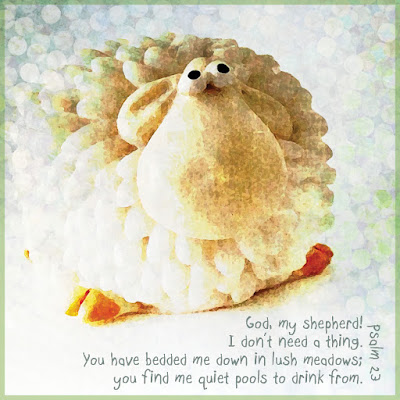I don't need thing.
You have bedded me down in lush meadows;
you find me quiet pools to drink from.
Psalm 23
Psalm 23
1 The Lord is my shepherd, I shall not want.
2 He makes me lie down in green pastures; he leads me beside still waters;
3 he restores my soul. He leads me in right paths for his name's sake.
4 Even though I walk through the darkest valley, I fear no evil; for you are with me; your rod and your staff— they comfort me.
5 You prepare a table before me in the presence of my enemies; you anoint my head with oil; my cup overflows.
6 Surely goodness and mercy shall follow me all the days of my life,
and I shall dwell in the house of the Lord my whole life long.
NRSV
Psalm 23
1-3 God, my shepherd!
I don't need a thing.
You have bedded me down in lush meadows,
you find me quiet pools to drink from.
True to your word,
you let me catch my breath
and send me in the right direction.
4 Even when the way goes through Death Valley,
I'm not afraid
when you walk at my side.
Your trusty shepherd's crook
makes me feel secure.
5 You serve me a six-course dinner
right in front of my enemies.
You revive my drooping head;
my cup brims with blessing.
6 Your beauty and love chase after me
every day of my life.
I'm back home in the house of God
for the rest of my life.
The Message (MSG) Copyright © 1993, 2002, 2018 by Eugene H. Peterson
Halfway through Lent
The church's year of grace has reached the fourth Sunday in (but not of) Lent, because every Sunday is a little Easter. This midway point has several traditional names and practices. In the North American church, Laetare – "Rejoice" – probably is best known. Each Sunday in Advent and Lent has a designation taken from the opening of the Latin Introit or entrance prayer; for Lent 4, "Laetare Jerusalem" ("Rejoice, Jerusalem") comes from Isaiah 66:10. On the Third Sunday of Advent, Gaudete also means rejoice, be glad. The idea is to take a short break to lighten up before the relatively somber season continues. Lent 4 is Mother's Day in the UK.
Psalmody, Hymnody
The psalms or the psalter is the hymnal of the synagogue. Unlike most of scripture that leans in the direction of God addressing humanity, psalms overwhelmingly feature humans addressing God. Because of this, they're well known for expressing every imaginable feeling, emotion, and desire.
The psalter was the hymnbook for John Calvin's Geneva Reform. Most contemporary hymnals including dozens of psalm paraphrases, from metrical to lyrical. The psalms probably are the Old Testament book most Christians know best. When we follow the Common Lectionary in the context of the church's historical liturgy, each week's psalm is (ideally sung or chanted) a response to the first reading and not considered a reading or lection.
Scripture and Context
Besides today's Psalm 23, many scriptural narratives originated in an agricultural setting.
• Abram/Abraham left Ur in Chaldea because of the land God promised: "Now the Lord said to Abram, 'Go from your country and your kindred and your father's house to the land that I will show you.'" Genesis 12:1
• God commanded Moses, "Go up to a land flowing with milk and honey…" Exodus 33:3a Milk and honey is a sign of the fullness of God's reign in justice and righteousness for all creation
• In the gospel of John, Jesus announces, "I am the Good Shepherd. I know my own and my own know me." John 10:14
• …but Jesus of Nazareth lived and ministered in a mostly urban, completely colonial context. A well-tended garden or field grows into a city.
• Land is central in both OT and NT; land is central to our existence—well-stewarded land is necessary for individual and community well-being.
We call our church leaders pastor, the Latin word for shepherd. A pastor I served with told me whenever he thought of that congregation's founding pastor, he always remembered pastoral means "rural."
Theological Comfort Food
"The Lord is my Shepherd"—Psalm 23! Easter 4 is Good Shepherd – Psalm 23 – Sunday every year. And Matthew's lectionary year A schedules it for Lent 4. Besides translations and versions of the biblical text, there are near-countless paraphrases of Psalm 23. "The Lord is like my Probation Officer…" Did one-time shepherd King David write this psalm? No one knows, but any sheep-tender would have known the words and imagery well.
Conventional translations refer to God in the third person in verses 1 through 3, and then address God for the remainder of the psalm. The Message speaks directly to God throughout.
Although green pastures and dark valleys sound countrified, we can translate those meadows and canyons into almost any psychological and physical realities. Flourishing green fields and disappointingly devastated neighborhoods? Families and livelihoods starting to be restored despite covid continuing; fallout from long covid and businesses that couldn't make it even with covid loan assistance.
Most hymnals have three or four musical settings of Psalm 23. What one do you especially like? My all-time favorite uses the tune Resignation from Southern Harmony; I especially love Randall Thomson's choral arrangement. I've mentioned that I no longer blog YouTube links because videos come and leave faster than I can remember to do a routine link check.
• Do you have a favorite musical / hymn version of Psalm 23?
• How would you express the ideas in this psalm for your own life?
• What's in your 6-course dinner?

No comments:
Post a Comment